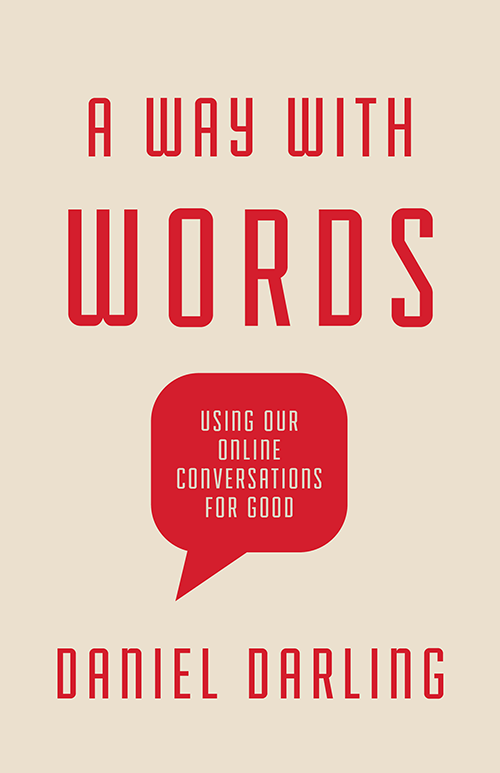In our social media age, we are often careless with our words online. And, in general, we devote so much of our time to reading, consuming, Tweeting, posting, and otherwise dealing with words online.
How should our faith inform our use of words — especially on social media? Enter Dan Darling’s new book A Way with Words: Using our Online Conversations for Good (B&H, 2020). which gives you the tips and tools you need to bring your faith to bear on your online conversations.

Dan Darling, Senior VP for Communications at National Religious Broadcasters, recently joined us to talk about his book, our words, and more.
We can be both civil and courageous at the same time.
Christians tend to speak on social media in ways they’d never dream of speaking face to face. Why is that?
There are several reasons we do this: First, our conversations are mediated through devices and we easily forget the humanity of the person with whom we are dealing. That person on the other side of Twitter is not an avatar to be crushed or a collection of pixels, but a human being, and even if they are wrong, they are not the sum total of their bad opinions. They are whole human beings made in the image of God.
Secondly, we tend to forget that it’s not important merely to be right. God cares just as much about how we say what we are saying. We are communicating being made in the image of a communicating God. This is why the Bible spends a lot of time on the shape of our words. The truth is that we can be both civil and courageous at the same time. We can “have an answer for every person” while being “gentle and kind” (1 Peter 3:15). The loudest person in the room is not the most courageous. All caps does not equal bravery.
Third, there is an aspect to some of what goes in on social media that is performative. I think some of the nastiness can be attributed to the reasons above or something going in on one’s personal life. But there is also the temptation to perform for a crowd, to curate a version of ourselves online that we find missing in real life.
Our faith is intrinsically related to words. God revealed himself to us with his inspired Word, the Bible. The Apostle John calls Jesus the Word. What, then, does this tell us about the importance of our words?
Christianity is a religion of words. As you said, Moses tells us that God spoke the world into existence. Jesus is described as the logos, the word. We have the written Word of God in the Bible. Christianity is expressive and emotive. The gospel came to each of us through words, either spoken or written. As image-bearers, one thing that separates us from the rest of creation is our high-level of communication. Animals sort of communicate, but I’ve never seen a hippo write a novel or an aardvark run for mayor. We are communicating beings. So this tells us something about why our words matter, why Proverbs is replete with admonitions on the wise use of words and why James 3 tells us our words, in a fallen world, can either bring life or death. Words matter to God, and we will give account for all of them.
Words matter to God, and we will give account for all of them.
One of the biggest catalysts to our rash speech online is FOMO — the fear of missing out. In A Way with Words, you explain that prayer can free us from FOMO. How is that?
One of the subtle lies of the digital age is that we can be all-knowing. I’m borrowing this idea from Jen Michel and her excellent book Surprised by Paradox, where she says that this was what Satan tempted Eve with: you can be like God and can know it all.
There is a difference between a holy curiosity that pursues wisdom and knowledge and trying to be like God and being all-knowing. Our inborn insatiable appetite for knowledge about God’s world is good. So good God gave us an entire book encouraging this in Proverbs. To seek wisdom is an act of humility, to acknowledge that we are not God. This is different than the kind of desire to be “in the know” in a busybody way that Paul talks about in his letters. This is the pursuit of junk food information that isn’t soul-satisfying. And this FOMO, this fear of not being “all knowing,” is what has us reaching for phones and scrolling our timelines to make sure we don’t miss anything.
You write, “Incivility has been with us since Eden, but the immediacy and availability of digital platforms seems to exacerbate this temptation.” What practical steps can we take to fight this particular temptation?
We can take several steps. First, we should obey James 1:19 and be “quick to listen, slow to speak, slow to anger,” or we might say, “quick to read the whole story, slow to post, slow to internet rage.” We don’t have to comment on every story, especially when it first breaks. We need to get all the information, slow down, wait and then ask ourselves if its worth saying something publically.
Second, we should keep the humanity of those online who disagree in front of us, and we should remember they are image-bearers. They have families who can google their name, they have worth and dignity. So when we disagree, let’s do it in good faith.
Third, we should regulate our news diet. America lives in two hermetically sealed news bubbles that suffer from confirmation bias and are resistant to facts. Each bubble criticizes the other and doesn’t understand it operates the same way. To get at the truth, we need to read from a variety of sources and pursue truth, even if it isn’t truth we like.






No comments have been added.